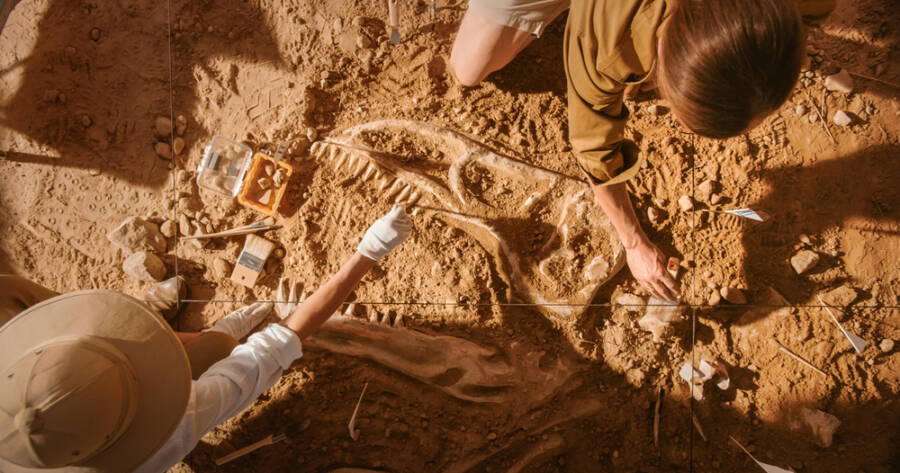Are you drawn to the idea of unearthing the secrets of prehistoric life? You might be on the path to becoming a paleontologist. In this guide, we’ll delve into the world of paleontology, exploring what this captivating field entails, the career opportunities it offers, and what steps to take to become a paleontologist. To learn more about this career and where to study paleontology, continue searching online!
What is Paleontology?
Paleontology is the scientific study of the history of life on Earth through the examination of plant and animal fossils. It’s like solving nature’s ancient puzzle, where each fossil is a piece that helps us understand the grand picture of the Earth’s evolutionary story. Paleontologists not only discover and collect fossils but also analyze them to piece together the lives of extinct organisms and the environments they inhabited.
What Does a Paleontologist Do?
Paleontologists are versatile professionals, donning various roles in their pursuit of unraveling the mysteries of the past. Their diverse responsibilities encompass:
Fossil Exploration: Paleontologists embark on expeditions in search of new fossil specimens, relying on sharp observation skills and geological insights to unearth ancient treasures.
Fossil Care: Once fossils are unearthed, they require meticulous extraction, cleaning, and preservation, ensuring their integrity for detailed examination.
On the other front, paleontologists delve into Research, diving deep into the analysis of fossils, studying ancient ecosystems, and making invaluable contributions to our understanding of evolution. Many of these experts take up the mantle of Education, serving as educators in universities and museums, imparting their wisdom to ignite the passion for science in budding minds. Furthermore, they ardently engage in Conservation efforts, working tirelessly to protect vital fossil sites and safeguard our planet’s rich natural legacy.
Where Do They Work?
Paleontologists can be found in a variety of settings, including:
- Museums: Many work in museums, where they curate collections, conduct research, and educate the public.
- Universities: Paleontologists teach and conduct research at academic institutions, contributing to the scientific community.
- Government Agencies: Some paleontologists work for government agencies, focusing on land management, resource conservation, and environmental impact assessments.
- Private Sector: A few may work for private companies in fields like environmental consulting or fossil excavation.
- Field Work: Fieldwork is an essential part of a paleontologist’s job. They explore remote locations, from deserts to quarries, in search of fossils.
How Do I Become a Paleontologist?
Becoming a paleontologist requires dedication and a strong educational foundation. Here’s a step-by-step guide:
- Education: Begin with a bachelor’s degree in geology, biology, or a related field. Undergraduate coursework should include biology, chemistry, physics, and geology.
- Gain Experience: Participate in internships or volunteer opportunities at museums or research institutions to gain hands-on experience with fossils.
- Pursue a Graduate Degree: Most paleontologists hold a master’s or doctoral degree in paleontology or a related field. Graduate programs provide advanced training and research opportunities.
- Build a Portfolio: Publish research, present findings at conferences, and contribute to the scientific community.
- Networking: Connect with other paleontologists, attend conferences, and join professional organizations like the Society of Vertebrate Paleontology.
Best Paleontology Courses
If you’re eager to dive into paleontology and begin your journey toward uncovering Earth’s ancient history, consider enrolling in paleontology courses. Online courses offer flexibility and access to top-notch educational resources. Here are a few options to get you started:
“Introduction to Paleontology” – Wondrium: Led by an award-winning professor, this course discusses how paleontology helps us understand the history of life and our changing planet.
“Paleontology: Theropod Dinosaurs and the Origin of Birds” – Coursera: This course, provided by the University of Alberta, focuses on the study of dinosaurs and the evolutionary transition to birds.
“Paleontology: Early Vertebrate Evolution” – Coursera: Another course provided by the University of Alberta, gives a comprehensive overview of the origin of vertebraes. It’s a four lesson course that is entirely free, but can come with a paid certificate. It takes about 4 weeks to finish.
“Introduction in Paleontology From Scratch” – Udemy: This online course is only $19.99 which provides 10 downloadable resources, 2 hours of on-demand video, a certificate of completion, and lifetime access. You’ll learn all the basics of palaeontology, from the history of dinosaurs to ancient plants and fossils.
Start Digging a Path to Your Future Today!
Paleontology is a captivating field that allows you to travel back in time and uncover Earth’s ancient secrets. As a paleontologist, you’ll contribute to our understanding of the planet’s rich history and evolution. If the world of fossils and prehistoric life intrigues you, don’t hesitate to explore paleontology courses and take your first step toward a rewarding career in uncovering the mysteries of the past.
